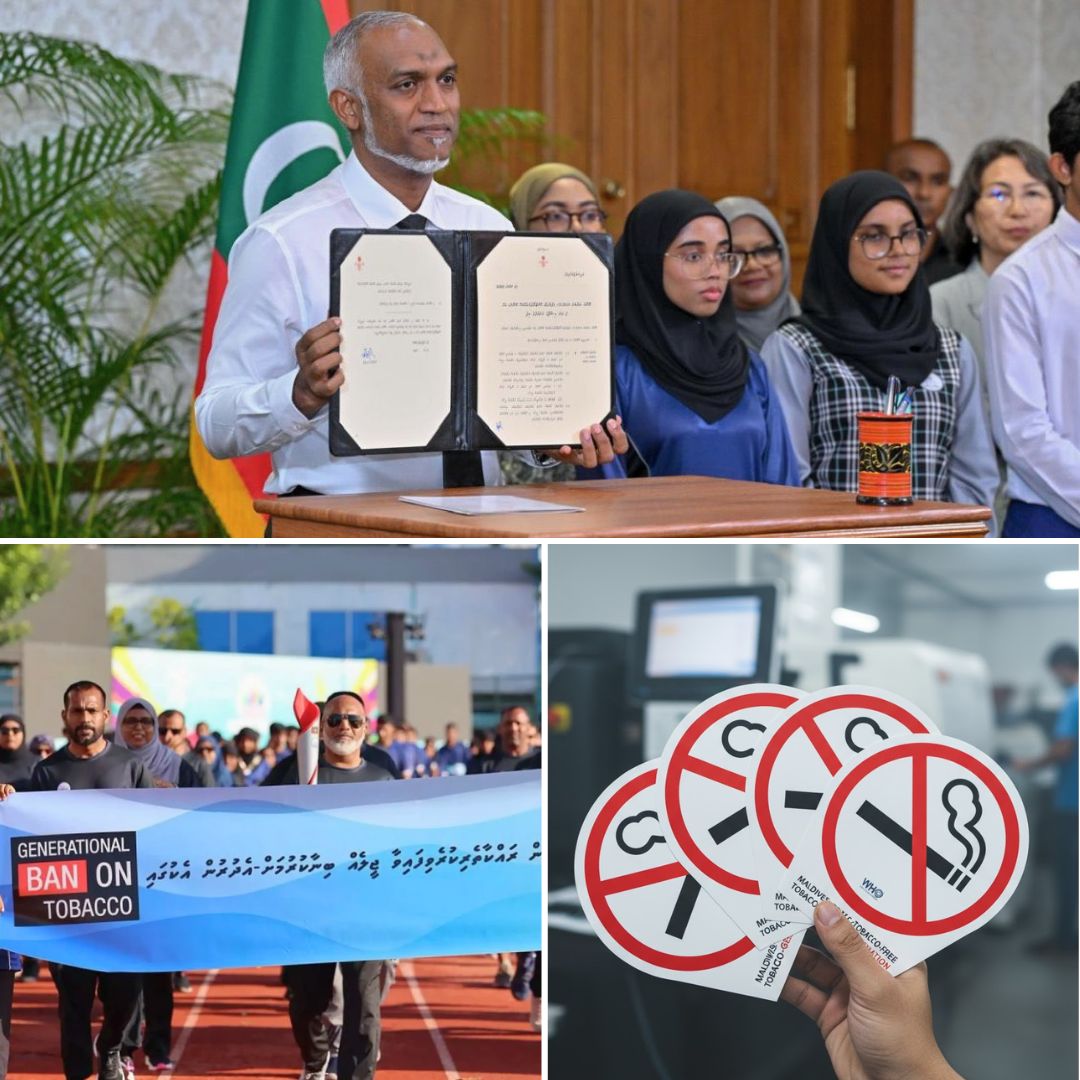Maldives has made history by enforcing a nationwide generational tobacco ban effective November 1, 2025, prohibiting anyone born on or after January 1, 2007 from ever buying, using, or being sold tobacco products, including vaping devices.
With this move, the archipelago becomes the only nation globally with such a regulation, earning praise from international health advocates and the World Health Organization.
Officials say the ban is intended to protect public health and promote a tobacco-free generation, covering both locals and tourists. Violators face steep penalties, and authorities have committed to establishing more cessation clinics to help affected communities.
Maldives Sets Global Precedent in Tobacco Control
The generational ban was signed into law as a Second Amendment to the Tobacco Control Act (Act No. 15/2010), approved by President Mohamed Muizzu in May 2025 and rolled out nationwide this November. The health ministry asserts the law is “a strong signal of the Maldives’ commitment to reducing tobacco use and protecting youth from lifelong addiction.”
The measure applies to all forms of tobacco – cigarettes, cigars, chewing tobacco – and even includes vaping products which are banned entirely for all age groups.
Retailers must now rigorously verify customer ages, facing fines of up to 50,000 rufiyaa (about ₹2.7 lakh) for selling tobacco to underage individuals; using vaping devices can result in a separate Rs. 30,000 penalty. The rules extend to tourists, reinforcing the country’s reputation for luxury and wellness tourism across its 1,191 coral islets.
The health ministry further clarified that import, sale, and distribution of tobacco products are strictly regulated and surveillance will be increased to ensure compliance.
Officials have stated, “This generational ban reflects our dedication to safeguarding young people and aligns with our obligations under the World Health Organization’s Framework Convention on Tobacco Control.”
President Muizzu echoed these sentiments by highlighting tobacco’s role in causing non-communicable diseases and premature mortality, calling the intervention “a bold, necessary step towards a tobacco-free future”.
Why the Ban? Health and Human Impact
Maldives has one of the highest rates of youth tobacco use in South Asia. A 2021 national survey reported that over a fifth of young people aged 15-29 smoke regularly, contributing to rising rates of cancer, heart disease, and other non-communicable illnesses.
President Muizzu’s cabinet issued a statement noting that as many as 30% of the population, or roughly 411,000 residents, are now potentially covered by the generational ban.
The government is actively collaborating with the Ministry of Finance and Planning to make smoking cessation programmes accessible nationwide. The Health Ministry has announced the upcoming rollout of specialized clinics and community outreach campaigns, offering education and support to those wishing to quit.
UNICEF praised Maldives for its leadership, calling the policy “an essential milestone in addressing the growing burden of non-communicable diseases among youth.” The World Health Organization also awarded President Muizzu its World No Tobacco Day Special Recognition for exemplary action and leadership.
The Maldives joins a handful of countries that have proposed similar generational bans. New Zealand was the first to enact such legislation but repealed it in late 2023 following a change in government. Meanwhile, the United Kingdom continues to debate its own generational ban through Parliament.
International health experts have described the Maldivian initiative as “bold and progressive,” with potential to inspire other nations facing youth addiction crises.
Enforcement, Critiques, and Community Response
While public health advocates have broadly welcomed the generational ban, some industry representatives and local retailers have raised practical concerns about enforcement and sustainability. Verifying identities and birthdates in the Maldives’ dispersed island communities could prove challenging, and questions remain about how the ban will be monitored among visiting tourists.
However, authorities maintain that robust digital ID systems and mandatory age checks will help plug most enforcement gaps.
The government also aims to incentivise entire neighbourhoods to declare themselves “smoke-free,” promising rewards and recognition for communities that successfully curb tobacco use among younger generations. At the same time, the penalties for violations are considered among the strictest in the region, underscoring the seriousness of the national commitment.
Health Minister Abdulla Khaleel stated, “This effort is more than law – it’s a comprehensive movement involving every household, every business, and every visitor to our country. We must act together to save lives.”
Maldivian families have voiced mixed reactions, with some lauding the ban for protecting children while others worry about the implications for traditional livelihoods tied to tobacco retail. Nonetheless, educational campaigns and dialogue are underway to address concerns and support smooth implementation.
The Logical Indian’s Perspective
The Logical Indian lauds the Maldives for pioneering such a visionary and courageous public health policy. By committing to a tobacco-free generation, the country demonstrates a vital, actionable model for others struggling with youth addiction and tobacco-driven disease.
This bold initiative can foster healthier communities, lower healthcare costs, and set powerful global precedents – provided it is accompanied by fair enforcement, community education, and ongoing support for cessation.
🇲🇻 Maldives just launched a generational smoking ban (Nov 1, 2025): Anyone born 2007+ (<18) incl. tourists is banned from buying/using tobacco. Vapes fully banned for all. Beside New Zealand the first country with a phase-out! 🚭 @EUCouncil @EU_Commission @AuswaertigesAmt… pic.twitter.com/QHXS9U6WL7
— Andreas Witte (@Andreas_Witte) November 1, 2025












